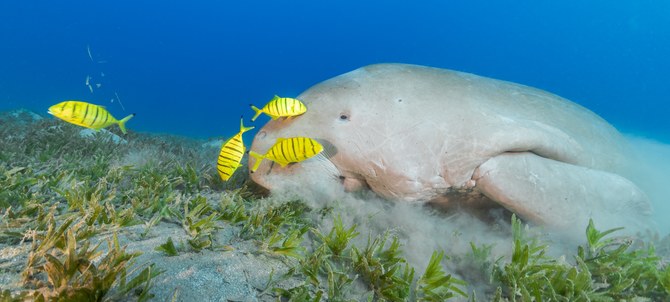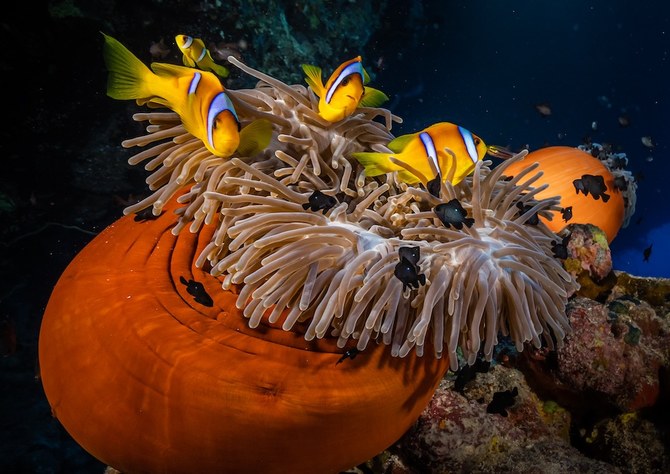LONDON: The Red Sea should be the most pristine sea in the world but its ecosystem also contains ancient endangered species and this should be treated as a global issue, according to the director of a new documentary.
The film, “RED, A sea worth protecting,” highlights the efforts of scientists and conservationists to save endangered species including the dugong, turtles and sharks, listed under the International Union for Conservation of Nature’s red list of threatened species.
“The point we are trying to make is that it is a global issue and you can have what is supposed to be the most pristine place in the world, like the Red Sea, which is a very strong sea, (but) you still have problems and it’s important that the governments, officials, policymakers, NGOs and scientists communicate that and do something accordingly,” said Philip Hamilton, the film’s director.

(Supplied)
“It’s one planet, the species migrate and they move (and) the problems of either coral bleaching, temperature rising or acidity is actually a global problem,” he told Arab News on the sidelines of a preview screening in London hosted by the Saudi embassy to the UK.
“So when we look at, for instance, the Red Sea, we should think about how we can protect the migratory species, how we can protect the pollution, moving from one place to another due to currents.”
The documentary, produced by UK-based Ocean Souls Films, focuses on ocean conservation. It starts with an introduction to the history of the Red Sea and its geography, highlighting its exceptional coral formations, mangrove forests and seagrass beds.

Philip Hamilton, director of ‘RED, A sea worth protecting’. (Supplied)
The film moves on to more specific details about the extraordinary, but critically endangered, marine species that make the Red Sea their home and provides an insight into what should be one of the “least concerning” seas in the world.
It follows the inspiring journey of a group of people dedicating their lives to protecting the Red Sea, sharing their frustrations and sacrifices, and their achievements and hopes.
“Even in the most remote places — thousands of kilometers south of the Antarctic Peninsula, you couldn’t possibly imagine that (after testing) certain animals who have never seen humans are infected with metals and microplastics and so on,” said the filmmaker, photographer and author.
The crew began filming the documentary — being presented at major international film festivals and soon to become available on social media channels — during the COVID-19 pandemic, which provided an opportunity to work in locations that would otherwise be crowded or full of tourists.
The Red Sea is a narrow strip of water lying between Africa and Asia, and which connects Saudi Arabia, Egypt, Jordan, Sudan, Yemen, Somalia, Israel, Eritrea and Djibouti.
Hamilton said that the team worked extensively with Saudi Arabia’s King Abdullah University of Science and Technology, which is doing extensive work via their coral research and development accelerator platform — launched in 2020 during the Kingdom’s presidency of the G20 to fast-track research and development solutions to save the world’s corals.

(Supplied)
“I know they are doing a lot (and) the reality is that they are top in the world in terms of the technology, the know-how, and the people they have,” said Hamilton, who has more than 30 years diving and sailing experience and has documented most marine animals on the planet.
“When you highlight the work of one scientist or one NGO, it’s very important for me that it inspires other people around the world because then you have the leverage effect that you really want,” he said.
“It’s great if you are an inspiration and you do great work in one place, and then you are being copied 100 times around the world and you have a real important effect.

(Supplied)
“I would love to see KAUST or plenty of other organizations be better known, not only by the scientific community, but people need to see all the great work they are doing.”
Hamilton called on the global community to increase collaboration and implement more marine protected areas. There was a need to replicate what happened in the Galapagos, Malpelo, Cocos and Coiba, he said, “where four countries got together and united to protect their own different individual zones and created one large corridor for species to migrate and be protected” throughout the migratory year.
“I think that’s what we need going forward,” he said. “We need countries to cooperate and go and act together.”

(Supplied)
Hamilton was speaking with particular reference to the UAE’s hosting of the UN Climate Change Conference, also known as COP28, which will be held in November. The UAE will be the second consecutive Arab country to stage the annual global gathering, after Egypt held it last year in the resort city of Sharm El-Sheikh, which also lies on the Red Sea.
“We need to protect certain species before it’s too late,” Hamilton said, calling for more integrated planning. “I would expect not only this film to inspire solutions, but for instance, if you want to further develop your tourism, have a look at what could be causing certain problems to certain species, so when you grow, you do it properly.”
Hamilton said Saudi Arabia’s Red Sea Project and NEOM were bringing scientists together to provide information as the development of tourism was being planned.
Territorial waters extended to a limit of 12 nautical miles, he said. After that, areas were considered exclusive economic zones but there was a lack of sufficient marine protection laws protecting them.
“When we think about nature, we need to think about no borders, no frontiers, no passports, no visas, no religion, no race. We need to think about the animals and ecosystems in a totally different way.
“But from there to implementing high seas policies and (doing this) worldwide, it is very, very hard (and) that’s a little bit frustrating,” he said.





































